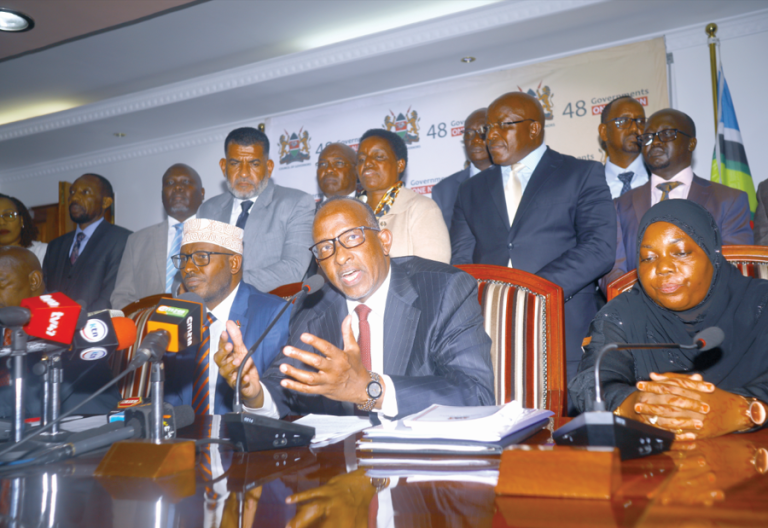Counties to absorb 8,000 UHC medics
By George Kebaso and Rawlings Otieno, April 15, 2025There is light at the end of the tunnel for more than 8,000 healthcare workers contracted under the Universal Health Coverage (UHC) at the height of Covid-19 pandemic.
National and county governments struck a deal yesterday that will see 8,500 healthcare workers – most of them discharging services in county health facilities – absorbed on permanent and pensionable terms.
They were employed on contract under the UHC programme by county governments in 2020.
This issue formed part of the key sticky issues in the 56-day strike staged by doctors last year. Nurses and clinical officers also demanded to be employed on a permanent and pensionable basis.
In the agreement, counties have been tasked to undertake a head count of the UHC workers to enhance accountability.
The Ministry of Health and Council of Governors (CoG) met yesterday at Delta House for a high-level consultative meeting bringing together officers from the two institutions.
“Further, the National Government to transfer resources for UHC workers at the Salaries and Remuneration Commission- SRC approved salaries scales to the Counties,” one of the resolutions signed jointly by Health Cabinet Secretary Aden Duale and CoG chairman,Ahmed Abdullahi, reads in part.
Disburse resources
Abdullahi is the Governor of Wajir. The ministry and the governors also agreed that Afya House shall disburse resources for salaries of UHC staff to counties.
This agreement aims to address concerns about the employment status of UHC staff, who were initially hired on contracts with the understanding that counties would eventually absorb them.
It’s understood that the purpose of absorption is to provide UHC staff with job security and ensure they receive appropriate benefits, including gratuity, which is a key concern for the workers.
It was also agreed that payment of Community Health Promoters (CHPs) shall be fast tracked.
The consultative meeting was organised to deliberate on issues emerging in the health sector including; implementation and roll out of the Social Health Authority (SHA); digitalization of health; absorption of the UHC staff; implementation of the National Equipment Service Program (NESP), and payment of CHPS.
Duale assured the governors of a better working relationship as opposed to his predecessors, promising frequent consultations with the realization that health is a devolved function.
The four-hour meeting also sought to unlock some of the priority areas for Duale as he takes over at Afya House.
CoG Health committee chairperson and Tharaka Nithi Governor Muthomi Njuki asked the national government to prioritise the absorption of UHC staff.
He supported their secondment to counties but with proper resource allocation as per the Salaries and Remuneration Commission (SRC) rates.
Consequently, CoG resolved to have the national government channel all payments for Community Health Promoters through county structures as opposed to two payrolls, one run by the national government and another by county governments.
Head count
Abdulahi proposed a new head count for CHPs so as to avoid payment of ghost workers.
CoG Vice Chair Mutahi Kahiga (Nyeri) called on President William Ruto to reduce the frequent changes in government, especially at MoH.
In Parliament, medics warned that failure to implement the 2017 Collective Bargaining Agreement (CBA) for the payment of intern doctors is likely to result in another nationwide strike.
SRC, Ministry of Health and doctors are yet to agree on the amount the medics should be paid.
Appearing before the Senate Health Committee, Duale said although the doctors union wants the medical intern doctors paid a Sh206,000, SRC insists that the economy can only allow a gross salary of Sh70,000.
“We have to be cognizant of our fiscal capability. SRC has advised that the medical interns be paid Sh70,000. The budget making is a function of Parliament. The bone of contention is Sh206,000,” said Duale.
In order to avert a looming nationwide industrial action, Duale said he will consult with President William Ruto and the National Treasury to solve the payment of Sh206,000 as per the 2017 CBA.
KMPDU Secretary General Davji Attellah told the committee that the 2017 CBA is yet to fully be implemented, and must fully be implemented prior to negotiation of a new CBA.
“The first thing is medical doctor interns, it took us to strike. To date, we are in limbo as to how much these interns will be paid,” said Dr Atellah.
This even as the Ministry of Health will take over the training of doctors for specialized courses and ensure that it bridges the shortage of staff, Duale said.
Duale said training of health professionals will revert to national government.
The CS said every year there are medical doctors, pharmacists and dentists undergoing postgraduate training under the Ministry of Health Programme to promote specialized training.
Duale attributed payment challenge to increased number of doctors graduating over the years. Initially, he said, only the University of Nairobi trained doctors, but at least 13 universities are currently training doctors.
